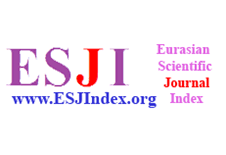The Impact of Speaking Assessments on English Language Learning and Student Perception
Akrambek Inomjonov
Kokand university lecturer
##semicolon## speaking assessments##common.commaListSeparator## English language learning##common.commaListSeparator## student perception##common.commaListSeparator## language educators##common.commaListSeparator## challenges##common.commaListSeparator## preferences##common.commaListSeparator## anxiety##common.commaListSeparator## confidence##common.commaListSeparator## feedback##common.commaListSeparator## group discussions##common.commaListSeparator## presentations##common.commaListSeparator## language development, fluency, vocabulary, pronunciation##common.commaListSeparator## grammar, supportive environments, diverse formats, language education practices.
सार
This study examines the impact of speaking assessments on English language learning and student perception. It investigates the experiences, preferences, and challenges faced by students during speaking assessments and explores the implications for language educators and policymakers. The study finds that while participants initially experience nervousness and anxiety during speaking assessments, they also report an improvement in their confidence in speaking English over time. Preferred assessment types include group discussions and presentations, which promote interactive and communicative language use. Participants also highlight the need for more frequent and constructive feedback to support their language development. Challenges identified include difficulty organizing thoughts, limited vocabulary, pronunciation, and grammar. The study emphasizes the benefits of speaking assessments, such as improved fluency, expanded vocabulary, and increased confidence. Recommendations for educators include creating supportive assessment environments, offering diverse assessment formats, providing timely feedback, and addressing students' challenges. The findings contribute to our understanding of the role of speaking assessments in language learning and offer insights for effective language education practices.
##submission.citations##
Alahmadi, N., Alrahaili, M., & Alshraideh, D. (2019). The impact of the formative assessment in speaking test on Saudi students’ performance. Arab World English Journal (AWEJ) Volume, 10.
Correia, R. C. (2023). ASSESSMENT FROM WITHIN–UNDERSTANDING THE KNOCK-ON EFFECT OF TEACHERS’PRACTICES ON CLASSROOM SPEAKING ASSESSMENTS. Education and New Developments, 142-148.
Fulcher, G. (2015). Assessing second language speaking. Language Teaching, 48(2), 198-216.
Hsu, K. C., & Liu, G. Z. (2021). Investigating effects and learners' perceptions of a student-led, AR-based learning design for developing students' English speaking proficiency. International Journal of Mobile Learning and Organisation, 15(3), 306-331.
Huang, B. H., Bailey, A. L., Sass, D. A., & Shawn Chang, Y. H. (2021). An investigation of the validity of a speaking assessment for adolescent English language learners. Language Testing, 38(3), 401-428.
Isaacs, T. (2016). Assessing speaking. Handbook of second language assessment, 12, 131-146.
Kocaman, O., & Balcıoğlu, L. (2013). Student perceptions on the development of speaking skills: A course evaluation in the preparatory class. Procedia-Social and Behavioral Sciences, 106, 2470-2483.
Taylor, L. (2003). The Cambridge approach to speaking assessment. Research Notes, 13, 2-4.
Menggo, S., & Gunas, T. (2022). College Student's Perception of Performance-Based Assessment Use in Boosting Speaking Ability. International Journal of Language Education, 6(4), 423-436.
Muslem, A., Zulfikar, T., Astilla, I., Heriansyah, H., & Marhaban, S. (2021). Students' Perception toward Oral Corrective Feedback in Speaking Classes: A Case at English Education Department Students. International Journal of Language Education, 5(4), 244-259.
Riadil, I. G. (2020). EFL students in speaking skill: identifying english education students’ perceptions of the psychological problems in speaking. JETAL: Journal of English Teaching & Applied Linguistic, 2(1), 8-20.
Turner, J. (1998). Assessing speaking. Annual review of applied linguistics, 18, 192-207.

















